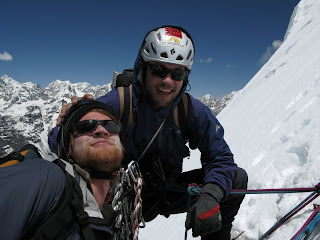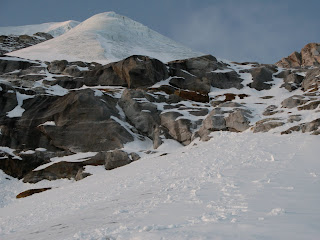
Goethe once said “he who has not attained fame by his 28th year, must give up all dreams of glory.” This begs the question—one which I’m sure some student would ask were I still in the classroom—who the fuck is Goethe, Mr. Miller?
On May 15th I had one more day to achieve fame in my 28th year or give up all dreams of glory. I was consoled by the fact that Goethe also said "the deed is everything, the glory is naught." For me, the deed was to guide two beginner climbers to the summit of a 6200 meter mountain in the Everest Region of the
I awoke on the day before my birthday to the sound of my boss, Matt Fioretti, telling me that he was abandoning the climb because of a hurt knee. He was leaving me with these two clients, a lot of responsibility, a lot of equipment and logistics to handle, some smoked salmon, and one big opportunity. One last shot at fame. He limped off into the morning storm cloud hastily, and I wondered if he knew where he was going exactly.
In a later email, Matt confessed:
"I have to tell you about the epic I had after I left you guys. Basically dropped way below the first notch with the prayer flags, spent 2 hours on 5th class walls with juniper getting back. Thought I would die there and know one would know what happened. I was navigating by viewing the ridge on the Namche side across valley. I realized I made a big mistake when I finally found the pass and crossed into the next valley. My mistake was obvious then. I had forgotten that you can view the same ridge from that valley thus putting me 1000 feet below the first notch. I was just going to come back to BC and give it another go. Crazy. By the time I got to Lukla my knee was toast and the next day Lhakpa and Dee helped me around. "
The only thing worse than dying is know one knowing what happened.
Over the previous weeks, I had been getting used to this new responsibility Matt had bestowed upon me. My first task, two weeks earlier, had been to FIND basecamp. I employed the novel strategy of hiring some locals (an old man and his yak) to take us up there, but mid-way through the journey, they turned back citing the yak's difficulty in overcoming a crux rock move. It had been snowing.
getting used to this new responsibility Matt had bestowed upon me. My first task, two weeks earlier, had been to FIND basecamp. I employed the novel strategy of hiring some locals (an old man and his yak) to take us up there, but mid-way through the journey, they turned back citing the yak's difficulty in overcoming a crux rock move. It had been snowing.










Iwas left with a true leadership crux, and I decided to lead by example and charge on into the brewing storm, hoping the others would follow. They did, and we found basecamp eventually, just as the weather cleared, revealing a mile long hanging valley, invisible from any other vantage point, surrounded by 5000 meter unclimbed peaks. From here,
Weeks later, we returned to find our camp covered in a foot of dense spring snow, the tent crushed, our hopes dashed. Matt leaving the group was another portent of what seemed to everyone as an oncoming disaster.
One signature of my overall personality though is a certain confidence coupled by immense inner turmoil and self doubt. When I say "oh yeah, that slope won't be avalanche prone" to the clients, what I'm thinking is (i hope we don't have a wind event-it faces east-let's see the prevailing winds... two days of sun--i wonder? Should i dig a pit? No that would take too long. What other red flags? the icy layer might not bond well with the new snow) etc. Ultimately though, I allowed us to proceed and I acted like I knew exactly what I was doing at all times.
Finding advanced basecamp was another instance of the I/i phenomenon. On my birthday, when we got the green light to move camp to within summit attempt range of
"Do you think we go to the gully at left or up that valley to the right?" queried Abe.
"There's only one obvious way to go." I snapped back at him, less out of an interest in silencing his dissenting and questioning my judgment and more in the interest of silencing the i which said in hushed tones growing louder (what if he's right? you can't see the top of the gully! how do you know? you can't even see it! It looks harder that way! What's at the top? you have no way of knowing!). This one route-finding mistake might turn out to be the end of our climb as we had only 3 more days until Matt had asked the porters to come to basecamp to carry our loads home.
We labored over the route which was steep up an unknown gully. Abe and Philip, burdened by heavy loads struggled all day to climb the snow covered boulder field; I could hear them curse behind me every time they post-holed through the snow, battling the inanimate. The nagging voice of self doubt came back and i dropped my pack to scurry to the top of the gully and kick steps in the snow for my partners to follow. That was the excuse I told them, but in reality i wanted to know what was at the top of the gully before we got there.
It was like I thought (I was wrong to doubt myself) and we reached camp, tent platforms kicked into the snow on the side of a moraine. We spent the next day in a whiteout, in suspense, hoping we were as close to the mountain as I had told everyone we were. I would occasionally shift in the tent and point confidently, in view of the others, and exclaim "the mountain is right over there." Later, when I went for a piss, I would peer into the whiteout and wonder whether my pronouncement had been true. I even went so far as to draw an arrow in the snow (with my pee) in the direction of
We crossed the glacier back to camp, went to sleep prepared to wake to the multitude of stars in the middle of the freezing Himalayan night and try for the top, our one and only chance at the summit of a mountain it had taken us a month of uncertainty to ready for.
12 hours later, I led the first mixed pitch as fast as I could, climbing through a rockband and over snowy slabs into a short chimney where pitons --pitons which neither Abe nor Philip knew how to remove--were the only pro. It was early morning by now, and I was worried at the slow pace of the two at the end of my double ropes. Philip, at the start of the difficulties had compared his legs to a certain dessert food endorsed by Bill Cosby, one which there is always room for, and I was worried about his ability to go to the summit. Abe was climbing well, but he had refused to wear his gaiters, even after I had suggested he do what I say and wear them, and his boots must have been soaked by now. "Fuck it" I thought, some people need to learn the hard way.
By the top of the third pitch it was clear that we were not going to make the summit moving as slow as we were. It was taking Abe and Philip twice as long to second each pitch as it was for me to lead, which didn't seem right to me. What were they doing wrong? Each of them was swinging their tools HARD into the brittle alpine bullet ice, and wasting time with solid placements which were not necessary on the less than vertical terrain. How could I explain to them how to move faster? How could I instill the years of experience necessary to climb a peak like this in faster than the time it would take to download a map of the approach route from the internet (also something I found impossible before the trip).
Philip then volunteered to stay at the third belay so that Abe and I could continue to the top, unimpeded by what he judged to be his slower climbing pace. With only one second, conceivably a faster one, I thought we might have a chance at the top, so I promised Philip a return time of 4:30 and Abe and I went up. We used a running belay for the next three pitches, crossing a bergschrund, and climbing seemingly endless 75 degree ice to a vantage point where the top was clearly visible, two pitches away.
I climbed fast without swinging my tools as the snow began to swirl around me, the afternoon clouds having closed in an hour earlier. I used just the points of my tools for balance, relying on my crampons to inch my body upward as I stared with desire at the belay above me. I wanted it, and I wanted it more badly than the capacity of my body to move. I wanted it so much I didn't swing-- I just desperately lurched upward, out of breath, every fiber of my being straining for 12 more feet of distance. As I set up the anchor and caught my breath, I started to ponder the inevitable downward journey. How many rappels would it take? Would i be able to find anchors at the end of each rope? Would we have to down-climb? It was late, and it was starting to snow.
If I turned Abe back this close to the summit, the experience would haunt him. To me it would mean nothing, but I know from experience that missing the top of


3 comments:
Regarding your decision to turn around, you might have mentioned that you were looking at five rappels, with darkness approaching, with two people who had learned to rappel the day before. There are pieces of guys who didn't want to turn around all around the bases of those mountains.
Great post.
Hey John,
Long time since we met and sat atop the summit of Denali, together. Thanks for forwarding the link. Nice read! I'll be in touch about this summer, got a few ideas to sort out, but since we're both in Asia, keep me abreast of your plans!
Cheers
Bryan "http://www.hylenskihammock.com"
When were you a mountain guide in the Himalayans? Is there anything you can't teach people to do? ^_^ Children, teens, adults... As a teacher, I'd love to get a few pointers from you on how you do it.
Post a Comment